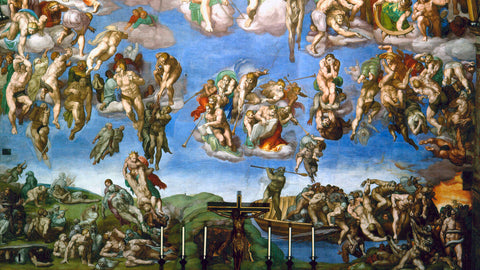The debate between predestination and free will is one of the most profound and complex theological themes in Christian history. In this discussion, the Catholic perspective gives a central place to free will, affirming its essential value in the relationship between God and humanity. This article explores this perspective in detail, highlighting the importance of free will in the Catholic faith and examining its role in the context of predestination.

I- Free Will: A Divine Faculty of Humanity
The doctrine of free will in the Catholic faith is based on the belief that man was created in the image of God. This image includes the ability to choose and decide for oneself. Free will is therefore considered a precious and sacred gift, a characteristic of humanity that distinguishes it from other creatures. It allows individuals to make conscious and autonomous choices, thus reflecting their active participation in their own destiny.
A. Responding to God’s Love
Free will in the Catholic faith is closely linked to the relationship between God and man. Rather than forcing obedience or submission, God chose to give individuals the freedom to respond to His love through personal choice. This highlights the importance of the loving relationship between God and man, based on desire and free will to respond to the divine call. Free will allows believers to choose to love and serve God of their own free will.
B. Human Dignity and Responsibility
Free will gives man a particular dignity, because it makes him responsible for his actions and choices. The Catholic faith teaches that each individual is called to account for his or her actions before God. This moral responsibility underlines the value of each human act and reminds us that the choices made here on earth have eternal consequences. Free will commits believers to live in harmony with moral principles and to be aware of their impact on themselves and others.

II. Harmony between Free Will and Divine Predestination
Although the debate between free will and predestination may seem contradictory, the Catholic perspective seeks to harmonize them into a coherent framework. For Catholics, predestination does not mean that God has predestined certain individuals to damnation or salvation, but rather that he knows in advance the choices that each person will make in complete freedom. This divine anticipation does not cancel human freedom, but takes it into account, thus preserving the vital role of free will.
A. Predestination and Divine Knowledge
In the Catholic faith, predestination is seen as an expression of divine knowledge. God, being outside of time, knows all things in advance. This includes the choices and actions each individual will make in their life. However, this knowledge does not suppress human freedom. Choices are always made freely by individuals, but God already knows the results.
B. The Mystery of Sovereignty and Liberty
The mystery of divine sovereignty and human freedom persists in the Catholic faith. Rather than seeing these elements as opposites, Catholics see them as complementary. Divine predestination and human free will coexist in the Catholic understanding, creating a balance between God's sovereignty and man's responsibility.

III. Free Will as a Response to Divine Grace
From the Catholic perspective, free will is not an isolated faculty, but functions in collaboration with divine grace. God's prevenient grace prompts human response, enabling individuals to choose good and reject evil. This cooperation between grace and free will is crucial for spiritual growth and personal transformation.
A. Grace and Human Cooperation
The Catholic faith teaches that divine grace is essential in directing free will towards the good. However, the human response remains essential. Grace does not crush freedom, but it supports and perfects it. Believers are invited to cooperate with grace by using their free will to embrace the divine plan and strive toward holiness.
B. Cultivate Virtue and Holiness
Free will offers believers the opportunity to cultivate virtue and holiness. Choices made freely in daily life shape character and determine spiritual direction. The Catholic faith encourages believers to nurture their free will by actively choosing to live according to the teachings of Christ, practice Christian virtues, and follow the example of Jesus.
C. Eternal Consequences
The Catholic faith also teaches that choices made here on earth have eternal consequences. Believers are invited to use their free will with discernment, because each act, each choice has an impact on their future life. The decisions made in this life reflect how they exercised their freedom and responded to God's call.

Conclusion
In conclusion, the Catholic perspective on the debate between predestination and free will favors the inestimable value of free will in the relationship between God and man. The Catholic faith teaches that free will is a divine gift that gives man the ability to freely respond to God's love and grace. Rather than being in contradiction, free will and divine grace complement each other harmoniously in the life of the believer.
Free will does not remove God's sovereignty, but it allows man to freely choose to conform to God's will. This human freedom, far from being restricted, is perfected by the grace of God. Believers are called to cooperate with this grace to live a virtuous life, in accordance with the teachings of Christ.
The balance between God's sovereignty and human responsibility is a mystery that reflects the depth of the Catholic faith. Rather than seeking to rationally explain everything, Catholics embrace this mystery and choose to live in harmony with divine grace, while exercising their free will in an enlightened manner.
Ultimately, in the Catholic faith, free will is a precious link between God and man, an invitation to choose love, truth and holiness. It reminds us that every act, every decision has eternal implications, and that every believer is called to actively participate in their own spiritual journey. Free will is a reflection of God's trust in humanity, his desire for communion and his desire that each believer become fully what he is called to be: a child loved by God, free to respond to his call with an open and grateful heart.
If you want to know about the end times in Christianity our blog article "Eschatology: The End Times and the Return of Christ" should be very popular





